What Academics Can Do Now to Prevent a Coup Later
The U.S. presidential election is five weeks away and there are worries that Donald Trump will not leave office should he lose, or that he will interfere with or stop the counting of votes if he believes continuing counting would reveal he lost.
As Barton Gellman writes in The Atlantic, some people have “a concern, unthinkable for presidents past, that Trump might refuse to vacate the Oval Office if he loses” but “they generally conclude, as Biden has, that in that event the proper authorities ‘will escort him from the White House with great dispatch.'” That’s not the worst case scenario, though:
The worst case is that he uses his power to prevent a decisive outcome against him. If Trump sheds all restraint, and if his Republican allies play the parts he assigns them, he could obstruct the emergence of a legally unambiguous victory for Biden in the Electoral College and then in Congress. He could prevent the formation of consensus about whether there is any outcome at all. He could seize on that uncertainty to hold on to power.
Daniel Hunter at Waging Nonviolence says we should call such a turn of events a “coup”:
One reason to use the language of a coup is that people know it’s wrong and a violation of Democratic norms—even if they’re not familiar with the exact definition of a coup. Language like “election tampering” or “voter suppression” signal deterioration of the democratic process. But if we get ourselves into a coup situation—like where Trump just won’t go—we need to help people help our country move into a psychic break.
We know it’s a coup if the government:
- Stops counting votes;
- Declares someone a winner who didn’t get the most votes; or
- Allows someone to stay in power who didn’t win the election.
These are sensible red lines that people can grasp right away (and that the majority of Americans continue to believe in).
People who do power grabs always claim they’re doing it to save democracy or claim they know the “real” election results. So this doesn’t have to look like a military coup with one leader ordering the opposition to be arrested.
If any of those [red lines are crossed] we have to declare loudly and strongly: This is a coup.
Of course, as Hunter says, “the best way to stop a coup is to not have one.”
Perhaps a post about taking pre-emptive measures to prevent a coup in the United States seems like an overreaction. I hope that it is. But we won’t know until later, so it’s worth asking what we academics can do now to help lower the chances of it happening.
Here are some possibilities, in part based on Hunter’s advice:
- In discussing the possibility of a coup and what to do about it, emphasize “widely shared democratic values” and widely shared epistemic practices, not the character of specific individuals. Resisting a coup will require cooperation among people with differing political views. This speaks in favor of (a) talking about common ideals traditionally expressed about the United States and its founding and (b) reminding people of the importance we place on evidence for making extraordinary accusations. It speaks against (c) bundling our rhetoric of coup-resistance with more contentious, divisive, or partisan issues and (d) villifying particular politicians in ways that will generate uncooperative defensiveness among those who supported them.
- Talk with friends, family, and contacts on social media about the possibility of a coup, raising awareness of the threat but doing so in a way that keeps 1, above, in mind. Try to get people thinking about what they will do if the election is thwarted or its results ignored.
- Set aside time to talk about the possibility of a coup during a class meeting with your students. There is probably a way for professors in any discipline to plausibly make the subject a relevant deviation from the planned syllabus if one needs to, but some may not feel they need the cover of relevance to bring it up, considering its importance. In discussing this issue with your students, keep in mind 1, above. The discussion need not involve “indoctrination.”
- Consider letting your students know in advance that you will not penalize them should they miss class for the sake of protesting a coup.
- Discuss with your colleagues how you should respond to a coup, and consider committing to a plan for what to do in regards to work.
- Talk with supervisors and university administrators now about the possibility of a coup and faculty plans in response. Try to get a public statement of a proactive commitment to democratic processes from your university president as well as information about how they might respond to faculty, staff, and student actions.
- Plan for peaceful resistance that conveys respect for democratic norms and stability. Hunter notes that when it comes mass actions, “historically, whichever side resorts to violence the most tends to lose. In a moment of uncertainty, people pick the side that promises maximum stability, respects democratic norms and appears to be the safer bet. It’s a contest of who can be the most legitimate. Mass resistance to coups wins by using walk-outs and strikes, refusing orders and shutting down civil society until the rightful democratically-elected leader is installed. For mass movements to succeed against coups, they should refuse to do violence to the other side.”
- Write publicly about the possibility of a coup and what is at stake for general audiences (again keeping in mind the advice in 1, above). Consider trying to place your writing in local newpapers or make appearances on local news outlets, rather than just big national platforms or discipline-specific venues.
Discussion and further suggestions are welcome, as are more specific talking points, strategies, lesson plans, action plans, and so on. Comments to the effect of “nothing we do will make a difference” are not. We know that the chances of any of our efforts making a difference is small. But it may nonetheless be worth making an effort if the stakes are high enough.
I made the above graphic. You’re welcome to download it, share it, print it on signs or bumper stickers or buttons, if you think it would be helpful.
Click on these for large versions of the graphic for signs (you may need to then open image in new tab to enlarge it to its full size):
Or on these for smaller versions for Instagram:
Or on these rectangular versions optimized for Facebook, and which should work well on Twitter, too:


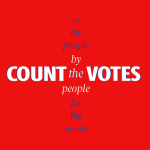
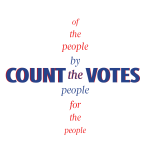
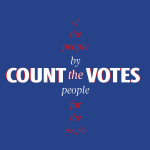
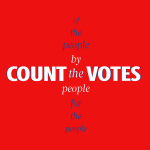
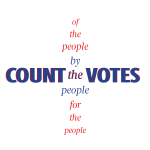
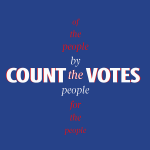
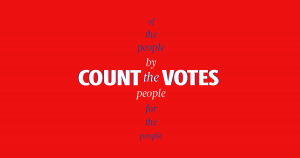
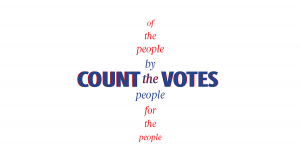
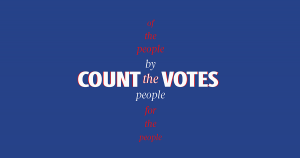

“Talk with friends, family, and contacts on social media about the possibility of a coup, raising awareness of the threat but doing so in a way that keeps 1 [emphasize “widely shared democratic values” and… not the character of specific individuals. , above, in mind.”] Try to get people thinking about what they will do if the election is thwarted or its results ignored.”
I understand the reasoning behind this, but I don’t think it’s really possible in this case. Look, for example, at the idea of “fake news.” This term had barely emerged into the public consciousness as an analysis of fabricated news stories on social media before it was appropriated by Trump to attack mainstream media outlets who ran stories unfavorable to his administration.
Similarly, a non-partisan, neutral discussion of democratic norms can be just as easily appropriated. Trump has already referred to last year’s impeachment proceedings as an ‘attempted coup,’ and the president’s supporters are already casting Democratic attempts to protect the integrity of the election as an attempted “coup” against the (soon to be rightfully reelected) President. See, e.g., some of the articles mentioned here: https://www.vox.com/policy-and-politics/21444007/biden-trump-2020-tucker-carlson-glenn-beck-coup
If I try to give my family a non-partisan appeal to democratic values and warn them to be prepared to resist a coup without mentioning who is like to be perpetrating such a coup, either (1) they’re already worried about this and may be more dialed in than I am, (2) they’re already worried about Democrats trying to steal the election with fraudulent mail-in ballots or other dirty tricks (like contesting counts after election day), or (3) they’re sufficiently disengaged to be equally susceptible to worries raised by those in group (2) – gosh, I guess both sides are just a bunch of politicians playing dirty tricks.
So if we’re worried about Trump and his allies in the Republican Party undermining the integrity of the election, I don’t see how we can pretend that we’re just making general statements about democratic norms, and hope that people will see where the threat to those norms lie.
*Who’s* plotting a coup? https://americanmind.org/essays/the-coming-coup/?
https://legalinsurrection.com/2020/09/democrats-are-telling-us-they-will-not-accept-a-donald-trump-win-are-you-listening/?utm_source=feedburner&utm_medium=feed&utm_campaign=Feed%3A+LegalInsurrection+%28Le·gal+In·sur·rec·tion%29
Surely you agree with shared democratic norms, such as the counting of all votes, even absentee ballots, such as those routinely cast by overseas members of our armed services. What other shared democratic norms can we agree upon now, so that we can join together as Americans to resist any attempt to corrupt or sidestep the shared democratic values that unify us as a nation, even across political differences? Let us not get distracted by divisive partisan issues or vilifying particular politicians.
you could actively align yourselves with students and staff to insure that they can vote and organize without being policed:
https://challengeinequality.luskin.ucla.edu/abolition-repository/
I don’t understand how the first two conditions are sufficient for calling something a coup. As a point I’m prepared to be wrong about, a coup requires overthrowing an existing government. Were an incumbent to refuse to leave, and no new government sworn in, then no existing government was overthrown.
As for why these conditions fail to be sufficient for qualifying an event as a coup, let us begin with the second one first since it is most obviously wrong. The second condition says that a coup occurs if a government declares as the winner someone who did not get the most votes. At the presidential level, we already have a system that recognizes individuals who do not win a plurality of votes as the winner. By the definition given, when the government certifies any candidate who wins the electoral college but loses the popular vote the winner, a coup has occurred. This is either obviously false or it can be granted that a coup occurred but it is false that all coups are wrong. (Or, the only votes relevant to determining whether a coup occurs are electoral votes, but then there is an equivocation on “votes” in the first two conditions)
The first condition holds that a coup occurs if the government stops counting votes. But this is a regular feature in elections. Challenges to absente ballots are not new, nor is it new for votes to go uncounted. It at least seems plausible that the 2000 Presidential election is one where not all votes were counted. At some point, it had to be determined what counted as a qualified vote and when to stop counting those votes. But, even if not all votes were counted, I wouldn’t characterize the 2000 election as a coup. Even if there is agreement that all votes should be counted, there is likely reasonable disagreement about the conditions for something’s counting as a vote. For example, even if there was agreement it would be a coup if all the votes in Pennsylvania were not counted, this isn’t helpful when there can be reasonable disagreement about whether naked ballots count as a vote.
Intentionally calling something a coup because you want to express displeasure with it and leverage its negative connotation is exactly the type of behavior philosophers try to discourage in classes. It makes for fun sloganeering, helps manipulate audiences, but makes for poor reasoning. Yes, perhaps some of the steps proposed for pre-empting a coup are reasonable, but I’m not sure how helpful they are if there isn’t broad agreement of what a coup is in the first place. I only say some because I think some of the steps encourage catastrophizing and other unhealthy mental habits.
Like
We know it’s a coup if the government:
Stops counting votes;
Declares someone a winner who didn’t get the most votes; or
Allows someone to stay in power who didn’t win the election.
From: https://wagingnonviolence.org/2020/09/10-things-you-need-to-know-to-stop-a-coup/
“Declares someone a winner who didn’t get the most votes” is importantly ambiguous. I *assume* that means most electoral votes–since that’s how our system works–but am worried it’s intentionally (or negligently?) trying to make a substantive point here about the popular vote.
In any case, maybe this is obvious, but: it’s not a coup if the government declares as the victor someone who’s received the most electoral votes, even if that person did not receive the most popular votes.
Maybe that’s good, maybe it’s bad, people certainly disagree. But it’s just a fact about how our government works.
I teach constitutional law and related subjects, so segues aren’t an issue. Regardless, based on my experience, addressing the issue would be either preaching to the choir for some students, or talking to a brick wall for others. The Trump base’s reality is so fundamentally different than that of more reasonable and informed people that general appeals like those above would probably not only be ineffectual but would be used as fodder for responses in favor of Trump, an example of this being Professor Bonevac’s response above. I do fear we’re past the point where shared values and ideas can meaningfully bring people together about this.
As nice as it would be to not have Trump as President, Daniel is unfortunately correct that it’s the Democrats who are more likely to be anti-democratic in this case. Even more unfortunately, the vast majority of people who claim to be concerned about democratic integrity only ever seem to discover this concern when there’s risk of an election outcome they don’t like.
If Democrats want power, they should stop running terrible campaigns with terrible candidates. Years of in-your-face hypocrisy, undermining democracy in their own favor, peddling conspiracy theories about Russia, alienating the left, and superficial resistance to the right while offering no alternative hasn’t worked for them. Trump will probably win and, just like last time, the DNC will astroturf an ineffective resistance.
Derek, I’d love it if more people actually cared about democratic norms but they clearly don’t. There’s seemingly very little unity even about what you mentioned and if who or what we’re fighting against gets replaced by someone or something just as, if not more, anti-democratic, it might not have been a distraction to have been critical of those alternatives.
The genre of “people in The Atlantic/NYT/New Yorker say we should be worried about X; here’s how can philosophers help people around them worry about X” is both tired and absurd.
I think Trump is a disaster in a plethora of ways. But as to “coups” … We’ve just had a presidential first term largely shadowed by a fishing expedition based on laughably unreliable sourcing (e.g., the source for the Steele dossier who now turns out to have been a known Russian agent) and dishonest FISA court filings, a fishing expedition used explicitly by opposing politicians, for years, to undermine the American people’s confidence in the 2016 election. We’ve had the anonymous op-ed from an unelected official congratulating himself and his collaborators for opposing the elected executive’s policies from within – published, of course, in our paper of record. We now have a flood of media think-pieces and political statements judging the Electoral College to be presumptively illegitimate if it doesn’t match the popular vote – that sure looks like it is preparing the ground for challenging the legitimacy of our Constitutional structures for elections. None of this absolves any particular irresponsible statement from Trump. It does make one wonder: whence the newfound concern for the sanctity of election results, and their credibility in the public eye?
And more to the point, we’ve got a bunch of positioning going on about what will or won’t be conceded in a contested election situation – from both sides. Why is that surprising, given that there is disputed change happening in election procedures due to, or occasioned by, the pandemic?
Trump can’t even get his executive orders put in place over judicial objections from random federal judges. The military brass is … not exactly a fan zone. He barely achieves unanimity of action for garden variety execution of his administration’s priorities. Yet he’s going to carry out a coup, somehow. This doesn’t pass any one of several smell tests.
The Republicans have been waging a campaign of targeted voter suppression for decades, using tactics from gerrymandering, to poll closures, to restrictions on early voting, to felony disenfranchisement, to very, shall we say, “selective” ID requirements, to purging voter rolls, to straight up lying to people (*cough* of colour *cough*) about deadlines. Call it a coup, call it ratfucking, call it simply undemocratic, but this multi-pronged attack (in words and in deeds) on mail-in voting is just one more way of achieving the same ends, and so, yes, I think it’s reasonable to be especially concerned with it, and to regard purported reasons in favour of it as pretextual. I also harbour concerns about Trump the man. Most presidents do not condition aid to allies on whether those allies announce — not even conduct, but *announce*, like, *on TV* — an investigation into a domestic political opponent. Most presidents are not worried about facing serious criminal charges upon leaving office. And so on, and so on, and so on… So I hope I can be forgiven for questioning his faith in certain basic grundnorms of a functioning democracy. But put all that aside; convincing the heretofore unconvinced that Trump’s a bad dude is a fool’s errand. The voter suppression piece is the 900-ton elephant (how heavy are elephants?) in the room.
Thing to do #1: Stop doing things like advancing this narrative, which is extremely alienating to those on the right, and exaggerates the danger and power of the Trump administration, such that if (to my mind, unfortunately, when) he wins, there will be widespread riots, violence, maybe worse.